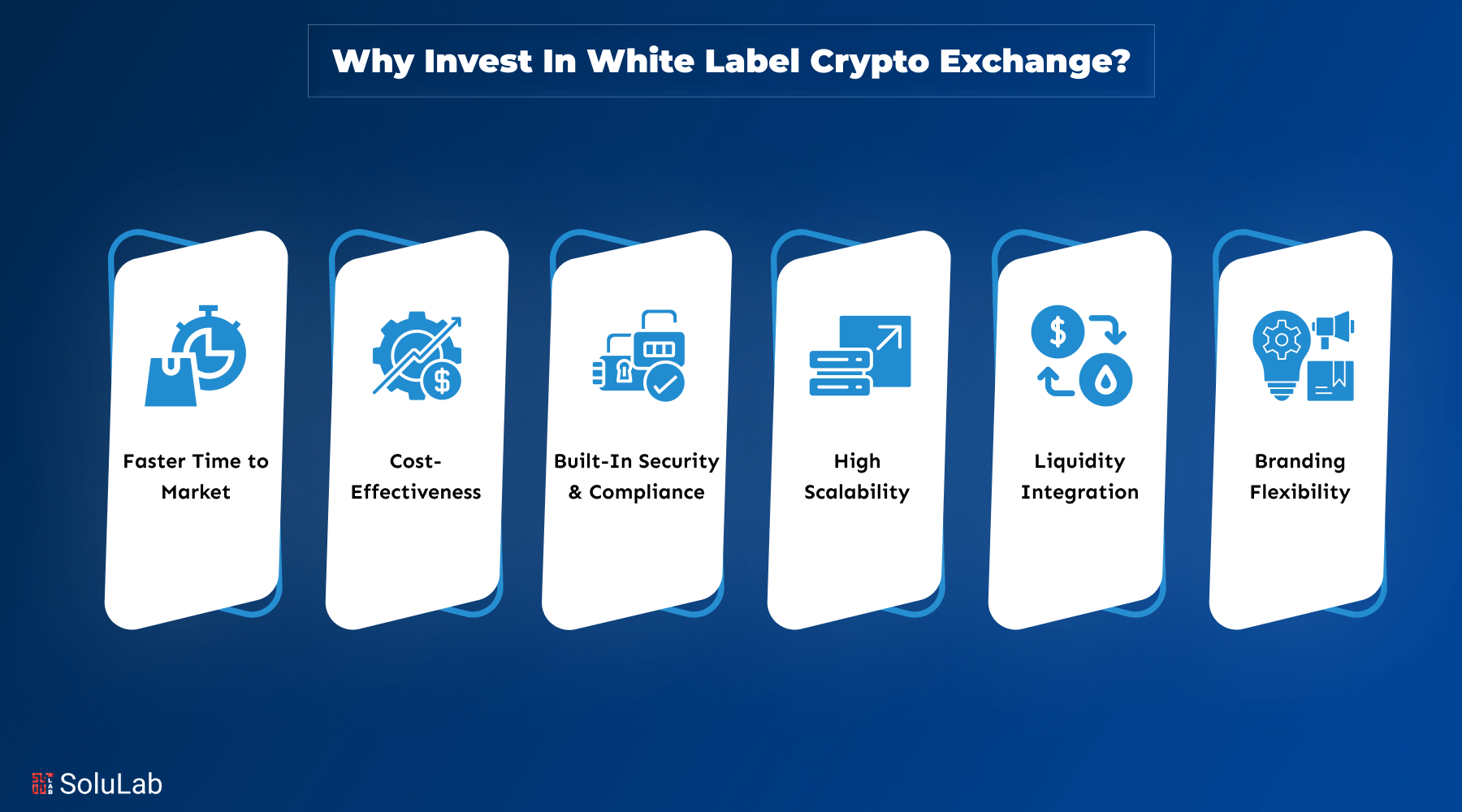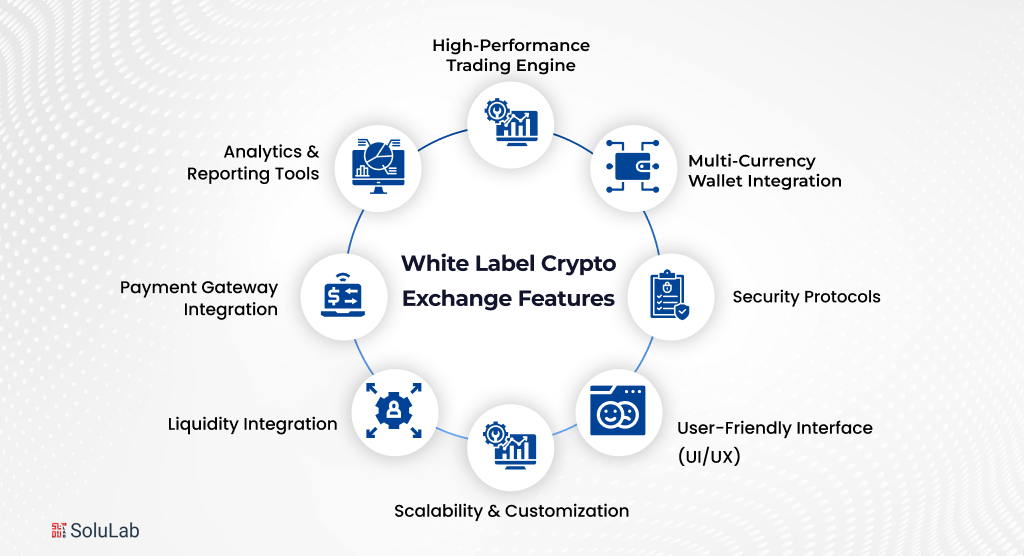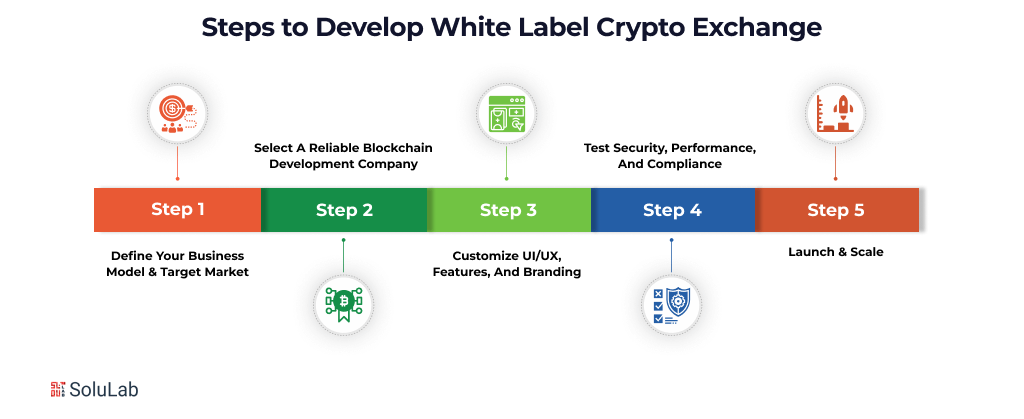
The crypto space is booming, and there’s no better time to launch your own exchange. But let’s be real, building one from scratch can feel overwhelming. It’s costly, time-consuming, and filled with technical and security challenges that can slow you down before you even get started.
That’s why more and more startups are choosing a White Label Crypto Exchange. It’s a smart, hassle-free way to hit the ground running with a platform that’s already built, tested, and secure—ready for you to add your branding and unique features. You get all the tools you need without the stress of coding or worrying about infrastructure.
If you’re serious about making your mark in the crypto world, this is the game-changing approach you’ve been looking for. Let’s make it happen together.
What is a White Label Crypto Exchange?
A white label crypto exchange is a ready-made, customizable trading platform that allows businesses to launch their own cryptocurrency exchange without building it entirely from scratch.
Instead of spending years developing core features like trading engines, wallets, liquidity systems, and security modules, companies can use a pre-built framework and simply brand it as their own.
These solutions usually come with:
- Trading engine – to handle buy/sell orders in real time.
- Wallet integration – secure storage for digital assets.
- KYC/AML modules – compliance tools for user verification.
- Liquidity options – access to deep liquidity pools for smooth trading.
- Admin dashboard – to manage users, fees, and platform activity.
White Label vs. Custom Crypto Exchanges
| Feature / Aspect | White Label Exchange | Custom-Built Exchange |
| Time to Market | Fast; launch in weeks | Slow; may take 6–8 months |
| Development Cost | Lower (ready-made framework) | Very high (built from scratch) |
| Technical Expertise Needed | Minimal (handled by provider) | Extensive in-house development team required |
| Customization | Limited to moderate (branding, features) | Fully customizable, from UI to backend |
| Security & Compliance | Pre-tested, built-in KYC/AML & wallet security | Must be developed, tested, and audited separately |
| Scalability | High, modular upgrades possible | Unlimited but requires time and resources |
| Liquidity Options | Often integrated with provider’s liquidity pool | Must arrange partnerships/liquidity independently |
| Maintenance & Support | Usually provided by vendor | Handled internally, needs a dedicated team |
| Best Suited For | Startups, SMEs, fast market entry | Large enterprises with long-term budget & vision |
Why White Label Is the Smart Way to Launch?
White label solutions make it possible to enter the market quickly, securely, and at a fraction of the cost. Here’s why they’re considered the smartest choice for startups and enterprises alike:
a) Faster Time to Market
With a ready-made framework, businesses don’t need to rework. Core components like trading engines, wallets, and compliance tools are already built and tested. This means you can launch your exchange in a few weeks instead of full development cycles.
b) Cost-Effectiveness
Building from scratch requires heavy R&D, blockchain experts, and ongoing audits—all of which are expensive. White label exchanges eliminate those upfront costs while still allowing affordable customization.
c) Built-In Security & Compliance
Security is non-negotiable in crypto. White label solutions come with pre-tested KYC/AML modules, multi-layer encryption, and secure wallet integrations. Since these systems are already proven, they minimize the risk of breaches and ensure compliance.
d) High Scalability
White label platforms are designed with modular architecture, meaning you can start small and grow big. If you want to add derivatives, NFTs, or integrate DeFi features, the system can evolve as your exchange scales.
e) Liquidity Integration
Liquidity is the lifeblood of any exchange. Most white label providers offer pre-connected liquidity pools, ensuring your users can trade seamlessly without facing slippage or order delays. This builds trust and boosts retention from day one.
f) Branding Flexibility
Although the core infrastructure is pre-built, the UI/UX is fully customizable. You can design the exchange to match your brand identity, colors, logo, and layout, while still benefiting from a robust backend. Unlike generic solutions, white label exchanges give you an owned identity that stands out in the market.
Must-Have Features of a White Label Crypto Exchange
A white label crypto exchange is only as strong as the features it offers. To succeed, it must combine speed, security, compliance, liquidity, and user experience. Some crucial features are:

1. High-Performance Trading Engine
The trading engine is the backbone of any crypto exchange. A white label solution must include a powerful, low-latency trading engine capable of handling thousands of transactions per second.
2. Multi-Currency Wallet Integration
A secure wallet system is essential for user trust and exchange functionality. A white label platform should provide both hot and cold wallet integration.
3. Security Protocols
Without strong security, even the best exchange won’t survive. White label exchanges must embed enterprise-grade security features.
4. User-Friendly Interface (UI/UX)
An intuitive interface ensures traders, from beginners to experts, can navigate the exchange easily. It must include a customizable dashboard and multilingual support.
5. Scalability & Customization
The platform must be future-proof, adaptable to market changes, and customizable to cater to the evolving business needs.
6. Liquidity Integration
Built-in liquidity providers guarantee seamless trading with minimal spreads and high transaction volumes.
7. Payment Gateway Integration
Support for fiat-to-crypto and crypto-to-crypto transactions makes onboarding easier for global users. Also, a smooth on-ramp/off-ramp makes it easier for users to adopt crypto trading.
8. Analytics & Reporting Tools
Data is critical for both users and admins.
- Users should get access to real-time price charts, market data, and trading history.
- Admins should have detailed reports on user activity, liquidity, revenue, and compliance logs.
Read Also: Build Hack Resistant Crypto Exchange
Why Startups Choose a White Label Crypto Exchange?
For startups entering the cryptocurrency space, a white label exchange isn’t just an option — it’s a game-changer. Here’s why so many startups are making this choice:
- Limited Capital
Building a crypto exchange from scratch requires huge investments in technology, security, and infrastructure. White label solutions remove this barrier, allowing startups to launch with minimal upfront costs and focus their budget where it matters most — growing their user base.
- Speed to Market
In crypto, being early or first in a niche can make or break your success. White label platforms are ready-made, tested, and optimized, helping startups go live in weeks — not years. Faster deployment means staying ahead of competitors and capturing market share early.
- No Technical Expertise
Running a secure, scalable crypto exchange involves advanced technology, compliance protocols, and constant updates. Most startups lack the specialized teams required. A white label exchange provides built-in technical expertise, so you can avoid costly hiring and focus on strategy and growth.
- Focus
Startups need to prove their idea, acquire users, and find product-market fit quickly. By outsourcing the complexities of development, startups can invest more time and energy into marketing, user experience, and community building — where success is truly made.
- Reduce Risk
A faster launch and lower operational costs mean your startup can stretch its capital further, buying more time to learn, adapt, and refine your offering. This significantly increases the odds of long-term success without burning out your resources.
How to Get Started with a White Label Crypto Exchange?
Launching a white label crypto exchange may seem straightforward, but success depends on the right strategy and execution. Here’s a step-by-step guide:

Step 1: Define Your Business Model & Target Market
Decide whether you want to focus on spot trading, derivatives, NFTs, or regional niche markets. Understanding your audience helps shape the right features, coin listings, and compliance strategy.
Step 2: Select a Reliable Blockchain Development Company
Partner with an experienced blockchain development company or a white label provider who offers secure, scalable, and customizable solutions. Check their track record, technology stack, and post-launch support services.
Step 3: Customize UI/UX, Features, and Branding
Tailor the exchange to reflect your brand identity with custom design, themes, and workflows. Add unique features like staking, multi-language support, or payment gateways to stand out.
Step 4: Test Security, Performance, and Compliance
Conduct rigorous audits, penetration tests, and load testing to ensure stability. Verify KYC/AML modules and compliance with regional regulations to build trust with users.
Step 5: Launch & Scale
Roll out your exchange with a strong marketing strategy and liquidity integrations. Continuously upgrade features, list new tokens, and scale into DeFi or NFT markets for long-term growth.
Real Life Applications of White Label
White-label crypto exchange platforms have enabled various businesses to enter the digital asset market quickly and efficiently. Here are some notable real-world applications:

1. SimpleSwap.io: Founded by two crypto enthusiasts, SimpleSwap.io launched with a minimum viable product (MVP) within a week. By leveraging white-label solutions, they attracted over 200,000 monthly active users and achieved an annual revenue of $600K.
2. Finvault: A fintech enterprise, Finvault utilized a white-label crypto exchange platform to integrate digital asset trading into its existing services. This strategic move enabled them to generate $2.64 million in annual revenue, expanding their product offerings to their established customer base.
3. HollaEx: HollaEx provides a comprehensive white-label crypto exchange solution catering to various businesses, from small online money exchange shops to large fintech enterprises. Their platform allows customization and scalability, making it suitable for regional or niche markets seeking tailored crypto trading solutions.
Conclusion
From startups quickly entering the crypto trading space to large enterprises expanding their digital offerings, white-label crypto exchanges have proven to be a game-changer. They provide faster market entry, reduced development costs, and the flexibility to tailor platforms to unique user needs.
At SoluLab, we specialize in building customized white-label crypto exchange platforms that are secure, scalable, and packed with advanced features. Whether you are a startup aiming to launch quickly, an enterprise looking to offer digital assets to your users, SoluLab can help you design, develop, and launch your platform.
By partnering with us, you don’t just get technology, you gain a strategic partner committed to helping your business succeed.
FAQs
1. How much does a white label crypto exchange cost compared to building from scratch?
Costs vary based on features and customization, but white label solutions typically cost 70-90% less than building a comparable exchange from scratch. Expect a significant upfront saving and lower ongoing maintenance costs.
2. Can I really customize a white label exchange to make it unique?
Absolutely! While the core engine is pre-built, reputable white label crypto exchange development solutions offer extensive customization options. You can tailor the UI/UX design, incorporate your branding, add specific trading features, and more.
3. Is a white label crypto exchange secure enough for my users?
Yes, when sourced from a credible provider. Security is a paramount focus for established white label crypto exchange development companies. They implement industry-standard security measures: cold storage for the majority of funds, multi-signature wallets, two-factor authentication (2FA), encryption, DDoS protection, and undergo regular third-party security audits.
4. Can a white label solution help with regulatory compliance?
Many white label cryptocurrency exchange solutions include built-in frameworks or easy integrations for essential compliance tools like KYC (Know Your Customer) and AML (Anti-Money Laundering) verification services.
5. How quickly can I realistically launch using a white label solution?
The speed is a major advantage. Depending on the level of customization required and your provider’s efficiency, you can launch your crypto exchange in as little as 4 to 12 weeks. This is dramatically faster than the 8-12+ months typically required for custom development.





